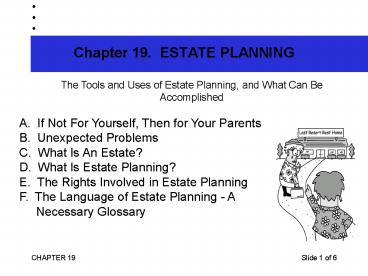Chapter 19. ESTATE PLANNING - PowerPoint PPT Presentation
1 / 6
Title:
Chapter 19. ESTATE PLANNING
Description:
The Tools and Uses of Estate Planning, and What Can Be Accomplished ... father, wanting to head off any post-mortem battles between Wife #2 and his kids, ... – PowerPoint PPT presentation
Number of Views:40
Avg rating:3.0/5.0
Title: Chapter 19. ESTATE PLANNING
1
Chapter 19. ESTATE PLANNING
The Tools and Uses of Estate Planning, and What
Can Be Accomplished
A. If Not For Yourself, Then for Your Parents B.
Unexpected Problems C. What Is An Estate? D.
What Is Estate Planning? E. The Rights Involved
in Estate Planning F. The Language of Estate
Planning - A Necessary Glossary
2
G. The Will - The Basic Clauses
1. Introductory Clause 2. Revocation of Prior
Wills 3. Debts and Final Expenses 4. Bequest
Clauses 5. Survivorship Clauses 6. Appointment
Clauses 7. The Execution 8. Changing a Will a.
When should a will be amended? 9. Uncommon Wills
3
H. Other Devices for Passing On Accumulated
Wealth 1. Trusts 2. Gifts 3. Insurance 4.
Joint ownership I. How to Proceed 1. The
Wrong Way 2. The Right Way
4
J. What Should Your Estate Plan Accomplish? 1.
Distribution and liquidity (See Personal Action
Worksheet, Text page 575) a. A costly
failure to plan b. Alternatives? 2. A sound
program of management for estate assets 3.
Assurance of continued lifestyle 4. Minimizing
taxes K. How Estate Taxes Work 1. Three kinds
- estate taxes, inheritance taxes, income
taxes L. Its Never Too Early to Plan
5
TALKING POINTS Chapter Nineteen, Number One
- One of the most overlooked aspects of estate
planning, especially by younger couples, is
arranging a guardianship of minor children if
both parents die simultaneously, even though the
odds are heavily against that happening. Assume
that you are a married parent of young children.
You want to deal with this problem. How would
you react to the following concerns about the
most likely candidates? (Note if you dont
establish a guardianship, it can be up to the
courts to do so.)
- 1. Your brother loves your kids, but hes not
married, and his lifestyle would be in
conflict with the best interests of your
children. - 2. Your spouses sister and her husband would be
ideal, but they already have three children of
their own. - 3. Your parents would adore being named
guardians, and they have the space and the money
to do so. But theyre well into their 60s and of
another generation. - 4. Your spouses parents live in a retirement
home 1,000 miles away. - 5. Your dearest friends, Pat and Fran, are
childless. But theyre not family.
6
TALKING POINTSChapter Nineteen, Number Two
- Your father is well off. He remarried soon after
your mother died. The new wife had little money
of her own. Your father prepared a pre-nuptial
agreement in which she agreed to accept a lump
sum of money instead of any share of his estate.
Thats fine with you, but how would you react if
you learned
- 1. Wife 2 never signed the agreement, and has
resisted doing so. - 2. Wife 2 signed the agreement and a few years
later they amended it so shed get twice the
amount set forth in the original agreement. - 3. Your father, wanting to head off any
post-mortem battles between Wife 2 and his kids,
gives her bonds equal in value to the amount in
the 2nd pre-nup agreement, and asks her to sign a
receipt acknowledging these bonds are in
settlement of the pre-nup. But the receipt,
unsigned, has disappeared. - 4. On your fathers death, Wife 2 claims that
she is owed the full amount of the 2nd pre-nup.
She states the bonds he gave her were a separate
gift and did not count toward the pre-nup
settlement.































